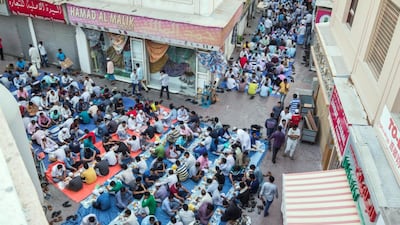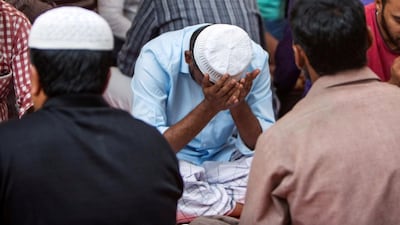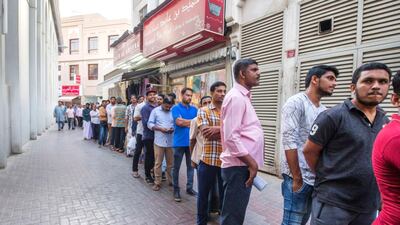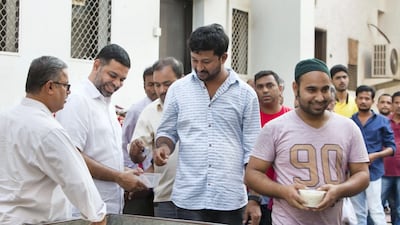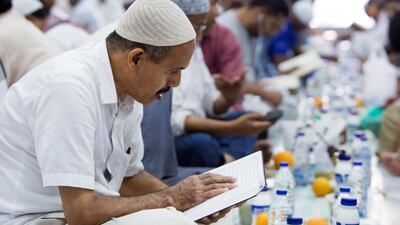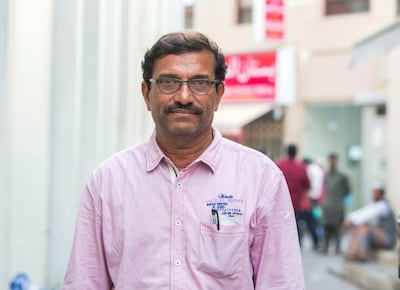In the winding lanes of Deira sandwiched between garment shops and restaurants, about 6,000 men break their fast daily with a sip of a special broth that is popular in southern India during Ramadan.
Seated on orange and blue tarpaulin stretched out across narrow paths leading to three mosques, thousands of workers in Dubai’s lively shopping district drink from plastic containers filled with kanji.
This rice porridge is also served in mosques to the faithful in India’s Tamil Nadu state during the holy month.
Word of the nutritious kanji filled with broken rice, minced meat and tempered with Indian spices has spread beyond low income workers to tourists from the UK and businesspeople from Africa.
Families from other emirates also flock to Deira’s Kuwaiti Mosque that attracts the biggest numbers.
From serving just 50 people in 1976, crowds have now grown to more than 5,000 people around Kuwaiti mosque, located behind Dubai’s old Gold Souk, alone.
The remaining kanji boxes are distributed near two other Deira mosques.
The practice began 42 years ago when a group of men from Tamil Nadu decided to give Indian workers a special treat to remind them of iftar at home.
The kanji was initially prepared in people’s homes and then moved to makeshift cooking stations near the mosque.
“We cooked this Indian speciality in a shed on the street and separated the area with a metal partition so it would not affect the business of shopkeepers nearby. That was 20 years ago when the numbers were still at 500 people,” said Illias Khan, who owns an air conditioning business and has volunteered with organisers the Iman Cultural Centre for the past two decades.
Fire safety rules then shifted the cooking to a warehouse in Al Quoz.
“Kanji is not normally available in Dubai so it is something unique during Ramadan,” he said.
The unusual nature of the porridge attracts new people every day with more than 1,000 queuing up more than an hour before iftar to be handed containers of the aromatic white broth.
Some take it to workers’ accommodations to break their fast with friends, others said they gave it to elderly relatives who could not make it to the mosque daily.
A system of handing out tokens has helped regulate the long queue and control crowds that grow restive when groups of men elbow their way to the front to gain quicker access to the kanji.
Shouts of “line, line, go back” erupt to deter any attempt to skip the queue.
Small shops along the street selling embroidered garments and abayas are shut for two hours in the evening as volunteers spread out the tarpaulin and lay out the kanji containers along with servings of oranges, dates, laban, water and samosas, a spicy deep-fried snack for each person.
An Indian family from Sharjah wanted to check if it was exactly the food they remembered from home.
_______________
Read more:
Meet the cooks that make 3,000 litres of porridge a day for fasting Muslims in Dubai
Dubai mosque's Indian kanji porridge draws Muslims from around the world
_______________
“It is good to sit with the children and eat the kanji so they know what it was like for us to break our fast at home. This is good but not as spicy as in Tamil Nadu,” said Yasmin Ahmed, a housewife who took her young son to a private area for women inside the mosque while her husband broke his fast outside.
Spices are an essential ingredient of the kanji that simmers for more than an hour-and-a-half in large aluminium vats in an Al Quoz warehouse.
A group of cooks work two shifts. The men scrape 180 coconuts, clean sacks of broken rice, soak lentil in buckets of water the night before and cut heaps of onions and tomatoes to keep essential ingredients ready for the second shift that prepares the kanji the next morning.
The heat from the massive vats to which chopped meat is added is so intense that the kitchen staff fire up only one 500litre vessel at a time.
“Coping with the heat is the most difficult during Ramadan. We cook in one vat and start on the next as the first one cools down,” said Usman Ali, owner of the Chennai Darbar Restaurant
“Biryani is more famous in the UAE. People may not know kanji here but in Tamil Nadu it is always served to break roza (fast) in the mosques. On an empty stomach this gives a quick release of energy to people who are fasting. The methi (fenugreek) seeds and yoghurt we add cools the body that gets heated up during the day and is very good for digestion.”
A truck fitted with a small crane lifts up each 300kg crate load filled with boxes of kanji to transfer the containers to the mosques.
More than 100 volunteers come together after work to distribute the iftar meals to three mosques in Deira.
“Volunteers come in after office and they stay to clear up after the crowds leave,” said Hameed Yasin, a logistics manager and general secretary of the Iman Cultural Centre that annually coordinates the effort between companies that chip in with supplies, kitchen staff and transport.
“Seeing the smiling, happy faces of people when they get the kanji gives our bodies all the energy we need.”
The registered charity also organises medical camps for workers.
Their work began when the small group of men launched the Ramadan kanji initiative that they funded themselves as part of the Indian Muslim Association.
The massive effort now requires daily co-ordination since the numbers can spike as usually happens over the weekend.
“All are welcome. You can come here whether you are a Muslim or non-Muslim, whether fasting or not. We just welcome people who are hungry,” Mr Yasin said.
